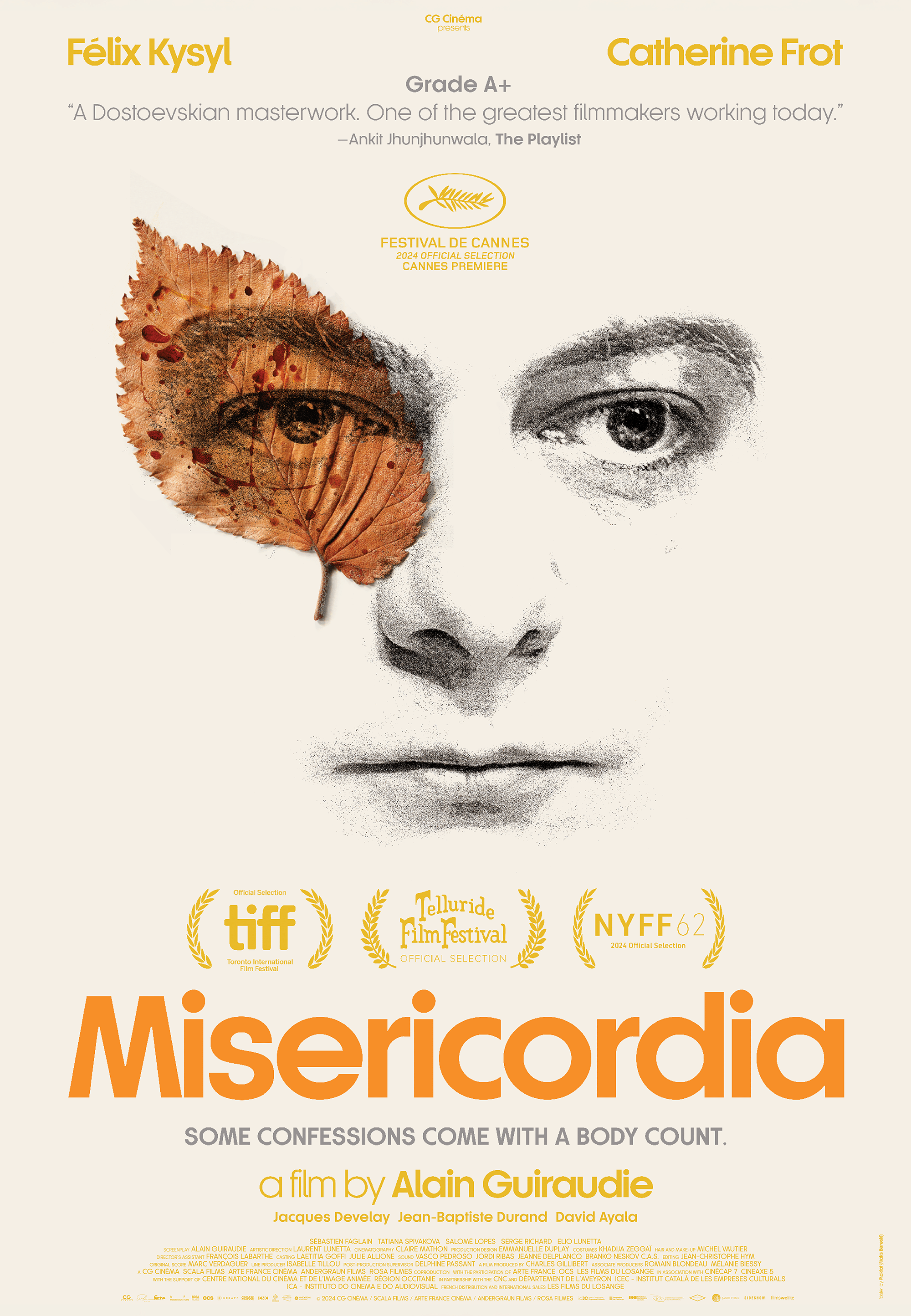
- Starring
- Félix Kysyl, Catherine Frot, Jean-Baptiste Durand
- Writer
- Alain Guiraudie
- Director
- Alain Guiraudie
- Rating
- n/a
- Running Time
- 102 minutes
- Release Date (US)
- March 21st 2025
- Release Date (CAN)
- March 28th, 2025
Overall Score
Rating Summary
French author Alain Guiraudie, known for such works as L’Inconnu du Lac/Stranger by the Lake and Rester Vertical/Staying Vertical, presents his latest film, Misericordia (or Miséricorde). The film, however, presents a difficult challenge when it comes to describing it. Here, Guiraudie tackles the story of Jérémie (Kysyl), a man who returns to his hometown of Saint-Martial for his boss’ funeral. Originally intending to go from Toulouse to Saint-Marital only for the funeral, little did he know that his visit would turn into an unexpected stay when his late boss’ widow, Martine (Frot), invites him to stay for a while in her house. The nostalgic journey becomes problematic once Vincent (Durand) questions his intentions of staying at his house, accompanying his home, and appearing again in their lives. Suddenly, this turmoil would boil over, leading to an extreme decision that would push Jeremie into participating again in the town’s day-to-day life.
The director, who also penned the script, crafts a chaotic ambiance designed to confuse audiences, leaving them as disorientated as the town’s residents. As a result, the enigmatic tones it creates work predominantly by placing Jérémie as the center of the tensions within the narrative. He does not talk about his memories of the town, other than as a ploy to convince others to interact with him. One example of this involves Walter (David Ayala), a man from his childhood who now wants nothing to do with him. Based on this, the story implies that Jeremie is a non-reliable character inspired from the pages of a French romance. He is a nuanced and complex character who can bring forth a range of emotions from audiences, as he is unpredictable.
With Jeremie, Guiraudie writes a man who contradicts himself at every turn. He furnishes explanations that interpolate in their lies. Even when he gives the context of his past, his actions are contrary to what he has told others. Though his words and his actions, he produces a steady stream of reasons why not to trust him. It is a truly fascinating act to watch it as Kysyl thrives in giving life to such a complex man. It is a cold performance in response to the series of situations Jeremie often found himself in, similar to how audiences may respond would they to be in the same predicament.
Going back to the story, in terms of development, the second act appears to lose interest in evolving. Rather, it seems more interested in situating its characters and how they act to conform to Jérémie and his troubling enigmas. That being said, some interactions are not as interesting as the lead with the Philippe Griseul (Jacques Develay), a priest who deals with his conscience and secrets but is not interested in judging wrongdoings. He believes that it is the Lord’s duty. Their relationship would spawn a fascinating series of conversations and actions responsible for some of Guiraudie’s best framing and camerawork.
Guiraudie uses church iconography to translate the mundane sins enveloping the town. An example of this is the use of confessional rooms and their limited spaces, using the window as a metaphor for what separates the priest and the sinner. Also, the cinematography by the legendary Claire Mathon generates the kind of atmosphere necessary to create the uncertainty the screenplay requires. The well-lit woods serves as a place for harvesting the mushrooms that Jérémie and Father Griseul collect, while the town is dark and foggy. It works as a crucial dichotomy in the misé-in-scene to reinforce the dramatic intentions of the film.
Through Misericordia (or Miséricorde), Guiraudie explores the enigma of the human condition, serving as a crucial study analyzing free will and how one can go against their own morality under the most extreme circumstances.
still courtesy of Films We Like
If you liked this, please read our other reviews here and don’t forget to follow us on Twitter or Instagram or like us on Facebook.
Brazilian film writer. He is also a producer and executive producer for Zariah Filmes. Member of the International Film Society Critics Association (IFSCA), International Documentary Association (IDA), and Gotham and Media Film Institute.
Discover more from
Subscribe to get the latest posts sent to your email.
